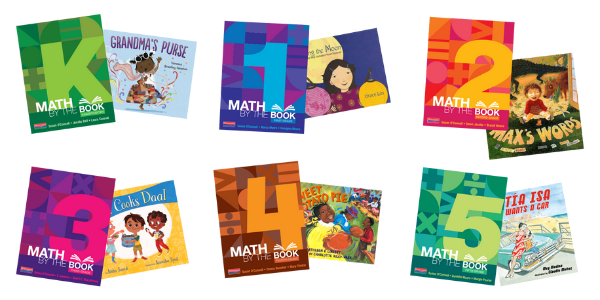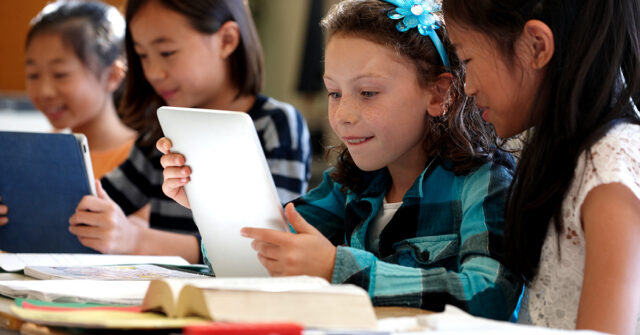
By Danielle Moore, coauthor of Math by the Book: Fifth Grade
For many students memorizing procedures has led to success in mathematics. Yet, many students continue to struggle to make sense of mathematical formulas and algorithms. They find themselves frustrated or underperforming each year. How do we help all students make sense of mathematics?
In the Math by the Book series, students engage with stories that help them see mathematics from an alternative perspective. Through word problems and investigations based on real-world scenarios and the lives of the characters in the books, students connect operations to problems in ways that make sense.
Developing Operation Sense
Through problem-solving, students develop operation sense, an understanding of the four operations (addition, subtraction, multiplication, and division), and the many different but related meanings these operations take on in real-world contexts. As students connect different meanings and relationships to the four operations, they more accurately and fluently apply these operations to real-world settings (Van de Walle, 2014).
Some upper-grade teachers may be hesitant to use literature to teach fifth-grade mathematical procedures. Upper-grade teachers might believe that reading aloud picture books is a primary grade activity and that their students are too old to engage with picture books. In the upper grades, teachers may also feel pressure to perform well on state math assessments. The pressure upper-grade teachers can feel leads some teachers to focus their math instruction on memorizing procedures, standard algorithms, and drilling facts. Literature can support and enhance mathematics instruction.
By giving students an image or a real-world situation to connect mathematical procedures and algorithms to has real benefits:
- It builds their procedural knowledge
- It grows their understanding of important concepts
- It increases engagement
- It provides opportunities to practice justifying their reasoning.
Effective teaching practices provide experiences that help students to connect procedures with the underlying concepts and provide students with opportunities to rehearse or practice strategies and to justify procedures (NCTM, 2014).
Linking Concepts and Procedures through Literature
The stories and investigations in the Math by the Book series help students make explicit connections between mathematical concepts and procedures. Through the different sections in each unit of the Math by the Book series (Explore, Support, Enrich, Solve, Talk and Think, Practice, and Extend), students have multiple opportunities to make sense of the math while problem-solving and discussing different approaches with their classmates.
Consider the story My Papi Has a Motorcycle. Daisy loves riding through her community on the back of her Papi’s motorcycle. On her rides, she crosses paths with the individuals in her community, such as the librarian and Mr. Charlie, the mail carrier. She sees the retail spaces like the Tortillería and Joy’s Market, the economic backbone of the place she calls home.
By exploring Daisy’s community, students can explore the concepts related to the Order of Operations and make sense of the rules. Students in fifth grade and beyond must apply the order of operations without necessarily understanding the reasoning behind the rules for them. After Daisy and her papi pass by Joy’s Market, students can practice formulating expressions:
- How many peppers were sold at the grocery store last week? Three times as many as 43 [or (3 x 43)]
- How many onions were sold last week? Five times the difference between 167 and 95 [or 5 x (167 – 95)]
- Students can also imagine and discuss how removing the parentheses would affect the eventual answer.
In fifth grade, students can use My Papi Has a Motorcycle to consider the themes of economic development, gentrification, or economic stability by calculating how much produce Joy’s Market must sell to pay the rent on their building or how much money Joy needs to be saved to purchase the entire building.
Extending Students Mathematical Reasoning
Students can continue creating and analyzing the expressions to determine what is the same about them and what is different. Questions students ponder are: When might we use parentheses? How does the language of the problem impact how the expression is written? Rather than blindly following a rule, students learn how real-world situations and language affect mathematical expressions.
Not only do students learn the steps for the Order of Operations, but they also develop an understanding of their purpose, how to record the difference and sums between values in an expression, and the connection between operational symbols and language.
While students work through problems, they can connect their answers back to the story or the situation and ask themselves, "Does this make sense?"
Try creating expressions for the following problems:
How might you combine the numbers (9, 10, 8, and 1) to equal a value of 10? What operations would you use? Where might you put the parentheses?
| (9 + 10) – (8 + 1) or (9 x 10) ÷ (8 + 1) | ||
| If students create the expression 9 + (8 x 10) + 1, teachers can ask students to evaluate the expression to determine whether or not it equals 10. |
Johnny has 157 books in his collection. His mother has a 12-month subscription that delivers 3 new books per month. How many books will Johnny have by the time the subscription ends?
| 157 + (12 x 3) | ||
| If students add the 157 and 12 together, teachers might ask them how that relates back to the story. |
Students can practice justifying their equations and why the operation symbols that used make sense in relation to the story.
Mathematics is not just the study of numbers. Mathematics is a way to use numbers and operations to describe the world around us. While a writer may use a verb to describe a character's actions, a mathematician can use an operational symbol to describe how values change over time. Literature can open your students’ eyes to mathematics all around them. Students can begin to see that math is more than a series of calculations to be solved, but as a tool to make sense of the world and the changes around them.
* * *
Children's literature offers memorable opportunities to discuss mathematical ideas and connect those ideas to meaningful contexts. The new Math by the Book series is dedicated to teaching mathematics strategically through literature. Each book in this grade-by-grade resource features children's literature and a collection of activities and teaching strategies that uniquely address critical grade-specific skills and content.

Danielle Moore has over twenty years of experience working for diverse and urban school districts. As a classroom teacher, instructional coach, and currently as a mathematics consultant, Danielle works to ensure access to and equity in sound mathematical instruction for all.
References
National Council of Teachers of Mathematics. (2014). Procedural fluency in Mathematics: A position of the National Council of Teachers of Mathematics. Reston VA: Author.
Van de Walle, J., Karp, K., Lovin, L.H., & Bay- Williams, J.M. (2014). Teaching student-centered mathematics: Developmentally appropriate instruction for grades 3-5 (2nd ed.). Pearson.


